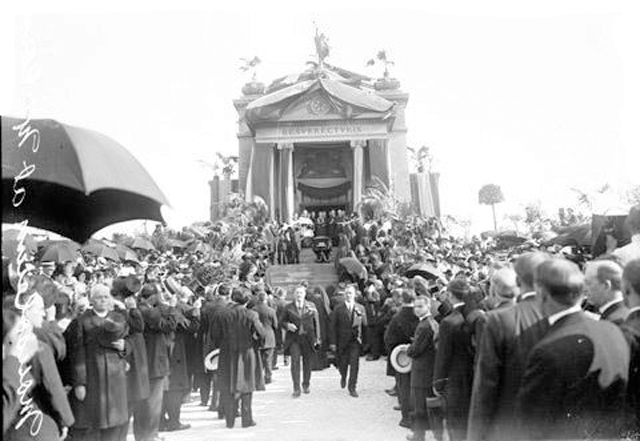The structure informally known as the Bishops' Mausoleum, designed by architect William J. Brinkmann, is located at Mount Carmel Cemetery and is the final resting place of the Bishops and Archbishops of Chicago; Its formal name is the Mausoleum and Chapel of the Archbishops of Chicago, and it is the focal point of the entire cemetery, standing on high ground. The mausoleum was commissioned by Archbishop James Quigley and was constructed between 1905 and 1912.
 |
| Funeral proceedings for Archbishop James Quigley at Mt. Carmel Cemetery. |
The roughly rectangular-shaped mausoleum has a stepped pyramidal roof surmounted by a statue of the Archangel Gabriel sounding his trumpet at the moment of the final resurrection.
sidebar
The remains of Bishop James Duggan were interred in the mausoleum in 2001 from his former resting place in Evanston's Calvary Cemetery. While Bishop Duggan died in 1899, his interment in the Bishop's Mausoleum is the most recent.
The mausoleum is designed as a Romanesque building outside with a domed Romanesque Classical chapel inside, complete with an altar, religious murals, clerestory windows providing light, and crypts flanking the altar on either side.
The Papal and U.S. flags also flank the altar. However, Brinkmann did not design the lavish interior, although he was more than capable, as evidenced by his interior for Our Lady of Sorrows Basilica. Instead, Archbishop Quigley engaged one of the foremost religious architects of the day, Aristide Leonori, noted for his 1899 design of the Mount St. Sepulchre Franciscan Monastery in Washington, D.C., as well as the interiors of early 20th-century Mediterranean churches.
For the mausoleum chapel interior, Leonori relied heavily on using marble and mosaics to give the chapel a Roman look while still referencing Celtic, Nordic and Slavic saints in the design, thus reflecting the archdiocese's many ethnic groups and national churches.
 |
| A craftsman replacing missing mosaic tiles in the interior. |
The most recent interment was the body of Cardinal Joseph Bernardin after he died in 1996 from liver and pancreatic cancer. Cardinal Bernardin had visited the chapel a few months before his death to select the site of his own crypt, choosing a spot to one side of the late Cardinal John Cody. Bernardin was said to have remarked, "I've always been a little left of Cody."
Notable people in organized crime buried at Mount Carmel Cemetery:
- Al Capone
- Frank Capone
- Ralph Capone
- Vincent Drucci
- Sam Giancana
- Genna Brothers (6) – Sam, Vincenzo, Pete, "Bloody" Angelo, Antonio, and Mike "The Devil"
- Jake Lingle – murdered journalist and mob associate
- Antonio Lombardo – Chicago mobster and consigliere to Al Capone
- "Machine Gun" Jack McGurn (aka Vincent DeMora)
- Charles Nicoletti
- Frank Nitti
- Dean O'Banion
- Frank Rio
- Roger Touhy – NW suburban Chicago mobster and beer baron, a rival of Al Capone and wrongly convicted through Capone's influence
- Earl "Hymie" Weiss – mob boss of the North Side Gang and a bitter rival of Al Capone.
Compiled by Dr. Neil Gale, Ph.D.











Just a small correction. The remains of Bishop James Duggan were interred in the mausoleum in 2001, from his former resting place in Evanston's Calvary Cemetery. While Bishop Duggan died in 1899, his interment in the Bishop's Mausoleum is the most recent. https://web.archive.org/web/20110708123626/http://catholicnewworld.com/archive/cnw2001/040101/final_040101.html
ReplyDeleteYour comment is not a correction. The article did not mention Bishop James Duggan. I did add the information as a sidebar.
DeleteGreat article.
ReplyDeleteAs always, Neil, you give us much needed accuracy and great coverage on things and places we nearly have forgotten! Thank you!
ReplyDeleteThank you for your kind words, Midge.
Delete